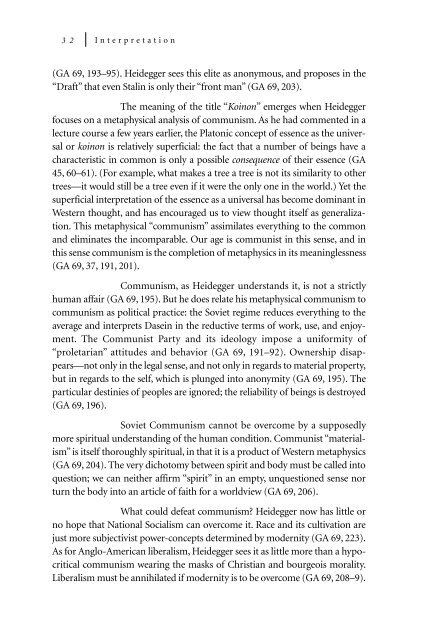Beyond Struggle and Power: Heidegger's Secret ... - Interpretation
Beyond Struggle and Power: Heidegger's Secret ... - Interpretation
Beyond Struggle and Power: Heidegger's Secret ... - Interpretation
Create successful ePaper yourself
Turn your PDF publications into a flip-book with our unique Google optimized e-Paper software.
3 2 <strong>Interpretation</strong><br />
(GA 69, 193–95). Heidegger sees this elite as anonymous, <strong>and</strong> proposes in the<br />
“Draft” that even Stalin is only their “front man” (GA 69, 203).<br />
The meaning of the title “Koinon” emerges when Heidegger<br />
focuses on a metaphysical analysis of communism. As he had commented in a<br />
lecture course a few years earlier, the Platonic concept of essence as the universal<br />
or koinon is relatively superficial: the fact that a number of beings have a<br />
characteristic in common is only a possible consequence of their essence (GA<br />
45, 60–61). (For example, what makes a tree a tree is not its similarity to other<br />
trees—it would still be a tree even if it were the only one in the world.) Yet the<br />
superficial interpretation of the essence as a universal has become dominant in<br />
Western thought, <strong>and</strong> has encouraged us to view thought itself as generalization.<br />
This metaphysical “communism” assimilates everything to the common<br />
<strong>and</strong> eliminates the incomparable. Our age is communist in this sense, <strong>and</strong> in<br />
this sense communism is the completion of metaphysics in its meaninglessness<br />
(GA 69, 37, 191, 201).<br />
Communism, as Heidegger underst<strong>and</strong>s it, is not a strictly<br />
human affair (GA 69, 195). But he does relate his metaphysical communism to<br />
communism as political practice: the Soviet regime reduces everything to the<br />
average <strong>and</strong> interprets Dasein in the reductive terms of work, use, <strong>and</strong> enjoyment.<br />
The Communist Party <strong>and</strong> its ideology impose a uniformity of<br />
“proletarian” attitudes <strong>and</strong> behavior (GA 69, 191–92). Ownership disappears—not<br />
only in the legal sense, <strong>and</strong> not only in regards to material property,<br />
but in regards to the self, which is plunged into anonymity (GA 69, 195). The<br />
particular destinies of peoples are ignored; the reliability of beings is destroyed<br />
(GA 69, 196).<br />
Soviet Communism cannot be overcome by a supposedly<br />
more spiritual underst<strong>and</strong>ing of the human condition. Communist “materialism”<br />
is itself thoroughly spiritual, in that it is a product of Western metaphysics<br />
(GA 69, 204). The very dichotomy between spirit <strong>and</strong> body must be called into<br />
question; we can neither affirm “spirit” in an empty, unquestioned sense nor<br />
turn the body into an article of faith for a worldview (GA 69, 206).<br />
What could defeat communism? Heidegger now has little or<br />
no hope that National Socialism can overcome it. Race <strong>and</strong> its cultivation are<br />
just more subjectivist power-concepts determined by modernity (GA 69, 223).<br />
As for Anglo-American liberalism, Heidegger sees it as little more than a hypocritical<br />
communism wearing the masks of Christian <strong>and</strong> bourgeois morality.<br />
Liberalism must be annihilated if modernity is to be overcome (GA 69, 208–9).
















